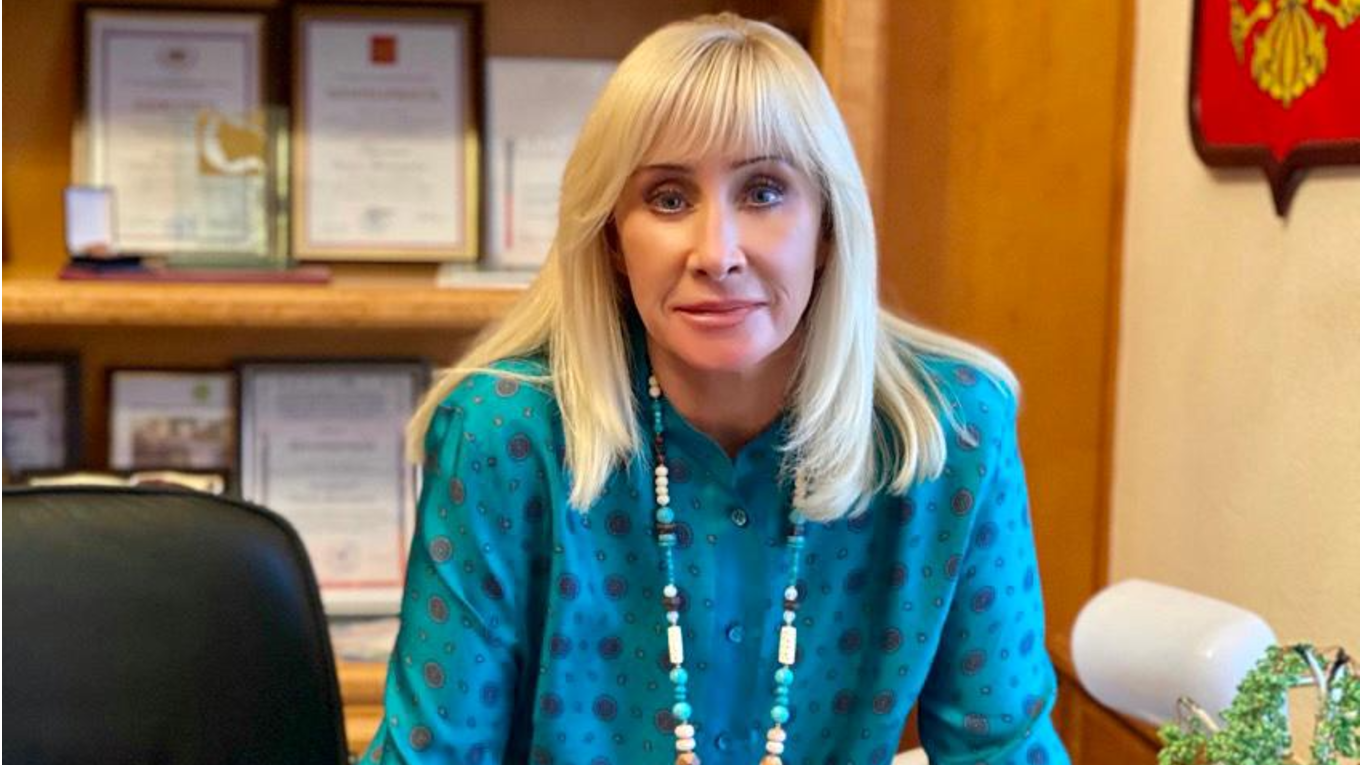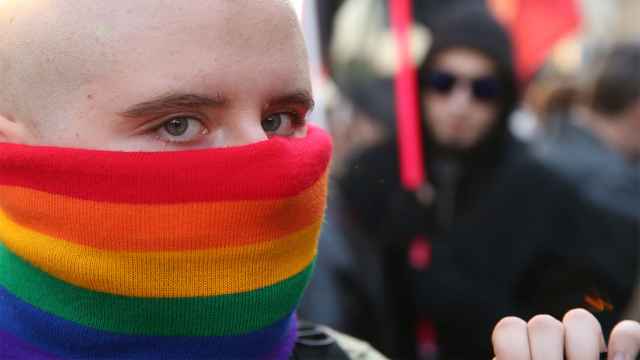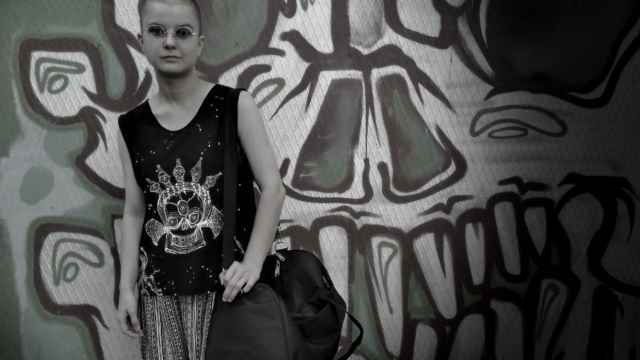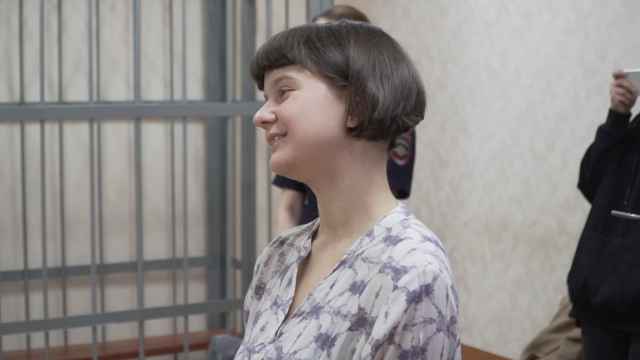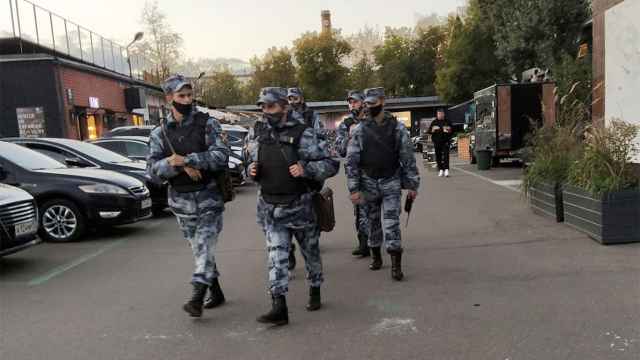When Oksana Pushkina was named one of the BBC’s women of the year on Nov. 23, it raised eyebrows among her fellow deputies in Russia’s State Duma.
“Some of my colleagues told me that it’s clear now — I’m obviously a foreign agent,” she joked in an interview with the internet television channel Dozhd.
Appearing on Dozhd — an independent channel with an opposition-minded audience — was fitting for Pushkina. A self-described feminist with pro-LGBT and pro-choice views, the charismatic former television host is by far the most prominent liberal in Russia’s parliament.
She is also a firm supporter of President Vladimir Putin and an elected representative of his United Russia party. With Russia’s turn to social conservatism deepening and its parliament increasingly stripped of power, that makes her one of the most distinctive voices in Russian politics today.
“Oksana is in many ways unique,” said Yekaterina Schulmann, a political scientist who studies the Russian legislature.
“She enjoys an unusual degree of independence.”
This year alone Pushkina — who remains loyal to the Kremlin on the big questions of foreign and domestic policy — has warned against the “Polish path” of abortion restrictions, signalled openness to same sex marriage and suggested that stay-at-home parents should be paid by the state.
Yet despite her contrarian views, Pushkina denies being anything other than a true supporter of the Russian government.
“Even though it seems like it, I’m not part of the opposition and my views are not at all oppositional. They are just common sense,” she told The Moscow Times.
For Pushkina, born in 1963 in the city of Petrozavodsk near the Finnish border, liberal politics are a natural product of her background.
Graduating from Leningrad State University’s journalism faculty in 1985, Pushkina embarked on a television career just as Mikhail Gorbachev’s breakneck liberalization of the Soviet Union was unfolding.
The anarchic, freewheeling spirit of Perestroika was formative to her politics.
“Since then I’ve always valued pluralism and had a respect for differing opinions,” she said.
Likewise, Pushkina’s feminism — which in 2018 made her the only Duma deputy to denounce vice-speaker Leonid Slutsky after he was accused of sexually harassing journalists — is rooted in her own experience of late Soviet television.
“It was all very simple,” she told television presenter Tina Kandelaki in December. “You would come to the office and the director would tell you that if you sleep with him you’ll get onto the staff.”
Most influential, however, were four years spent working in San Francisco in the mid-1990s. Against the backdrop of America’s then-nascent religious right gaining influence and popularity — and with its radical fringes resorting to violence — Pushkina developed a lasting distaste for politics mixed with religion.
“I saw in the 1990s how American radicals would blow up clinics and murder doctors who performed abortions. At the time, Russia was in an appalling economic crisis, but I couldn’t even imagine such things happening here.”
Today, with Russia’s own religious right on the rise and advocating restrictions on homosexuality and abortion, Pushkina described a feeling of “deja vu.”
“All the worst things I saw in America I see in Russia now.”
This year, having been targeted in the courts by Orthodox fundamentalist groups for her support of a bill to re-criminalize domestic violence, Pushkina suggested that draconian new laws criminalizing “foreign agents” in Russia — which she supported in the Duma — be deployed against the pro-Kremlin conservatives she accuses of receiving support from America’s Christian right.
“I am for preserving and strengthening the current political system,” she said.
“I see the real threat to the state coming from radical conservative groups.”
Returning home in 1998, Pushkina landed a show on NTV, then Russia’s most popular television channel, known for its hard-hitting reporting.
“Oksana Pushkina’s Feminine View,” the program she hosted from 1999 to 2013, was a Russian take on western talk show formats.
It was, however, in its own way radical. Focusing on ordinary women and children mistreated by abusive or absent relatives and spouses, Pushkina cast light on the systemic disadvantages suffered by women in Russian society.
“I grew up on her shows,” said Alyona Popova, a feminist activist who has worked with Pushkina on anti-domestic violence legislation.
“Her interviews always had a very clear feminist message, focusing on issues that affected women.”
With the rise to power of Vladimir Putin, NTV was forcibly taken over by Gazprom. With it came a pro-Kremlin shift in the station’s editorial line.
However, Pushkina’s female-oriented shows were left largely untouched.
Even so, as one of Russia’s most prominent television hosts in an increasingly government-controlled broadcasting sphere, Pushkina — a self-described “team player” — occasionally found her coverage overlapping with Kremlin political priorities.
In 2004, ahead of a Ukrainian presidential election that would grow into the Orange Revolution, Pushkina’s program, widely watched by Russian-speaking Ukrainians, featured a flattering profile of pro-Moscow candidate Viktor Yanukovych, who was portrayed as a loving family man.
In 2011, Ramzan Kadyrov, the pro-Kremlin leader of Chechnya who has since been accused of overseeing violent purges of gay men in the autonomous republic, received similar treatment on Pushkina’s program.
Move into politics
For Pushkina, who left NTV in 2013 to serve as Moscow Region Commissioner for Children’s Rights, a move into politics made sense.
Russian political parties, often widely unpopular among the electorate, regularly recruit celebrity candidates to burnish their images, especially in the single-member constituencies from which half the Duma’s members are elected. With famous cosmonauts, musicians and war heroes among her colleagues, Pushkina was among friends in parliament.
But in other ways Pushkina, who in 2016 was elected Duma deputy for the 122nd district, a constituency west of Moscow taking in the elite Rublyovka suburb where Vladimir Putin has his official residence, is unique within the Duma. Russia’s parliament is often seen as a political irrelevance, populated by deputies for whom loyalty to the Kremlin trumps political conviction.
“Most deputies have at least some obscure issues they’re interested in,” said Schulmann, the political scientist. “It might be some niche cause, or procuring favors for one business interest or other.”
“Oksana is different. She has a clear political position that resonates with at least part of society, and has the publicity skills to communicate that position.”
For Pushkina herself, the decision to go into politics was driven by the issues of family law, children’s rights and domestic violence that had characterised her television career.
“I came to the conclusion that many of the problems in the fields of maternity and children’s law are ultimately systemic, rooted in the failings of existing laws,” she said.
United Russia
Likewise, Pushkina’s decision to run for the broadly right-wing United Russia party was motivated by pragmatism, rather than conviction.
“I didn’t consider running for any other party because only United Russia made me an offer,” she said.
As part of United Russia’s Duma supermajority, Pushkina has enjoyed rapid advancement, becoming vice chair of the committee for families, women and children’s issues, a position that offers a pulpit for her views.
“Speaking as part of the Duma majority certainly gives more visibility to her stance,” said Schulmann.
Pragmatism aside, Pushkina’s association with United Russia is understable. Despite her deviation from the party line, she remains supportive of the Russian government and aims to achieve her goals through it.
“I might seem like an opposition figure, but in reality I have always been, and remain, part of the political system,” she said.
Mixed results
In some ways, Pushkina’s career is an acid test for Russia’s authoritarian political system: whether or not a high-profile, independent-minded lawmaker can successfully use the country’s institutions to advance their agenda while still remaining loyal to the government.
So far, her results have been mixed. Of the seven bills Pushkina has introduced since 2016, only two have made it into law.
Pushkina herself is clear-eyed about the prospects that her flagship bill re-criminalizing domestic violence will make it to the president’s desk.
“Today, conservatism is dominant in Russian politics and the majority of Duma deputies are of a puritanical persuasion,” she said.
“The current balance of power in parliament means I can’t count on easy passage.”
For some, however, focusing purely on legislation misses the point.
“Oksana is someone who can use her platform to make sure her liberal views are represented within the gloomy and rigid but fragile system,” said Konstantin Dobrynin, a former senator and lawyer who has represented Pushkina in her legal battles against far-right Orthodox groups.
In this sense, she is succeeding. According to one index of Russian deputies’ effectiveness, Pushkina is consistently among the most media-friendly lawmakers, being ranked as Russia’s eleventh most prominent deputy in July 2020.
Even so, with Russian public opinion heavily conservative on issues of gender and sexuality and the political establishment mostly unreceptive, Pushkina’s future trajectory is unclear.
“Oksana is much more optimistic about achieving change from within the system than I am,” said Alyona Popova, the feminist activist and domestic violence campaigner.
“Maybe if we had 30 more like her in the Duma, things would be different. But we don’t.”
A Message from The Moscow Times:
Dear readers,
We are facing unprecedented challenges. Russia's Prosecutor General's Office has designated The Moscow Times as an "undesirable" organization, criminalizing our work and putting our staff at risk of prosecution. This follows our earlier unjust labeling as a "foreign agent."
These actions are direct attempts to silence independent journalism in Russia. The authorities claim our work "discredits the decisions of the Russian leadership." We see things differently: we strive to provide accurate, unbiased reporting on Russia.
We, the journalists of The Moscow Times, refuse to be silenced. But to continue our work, we need your help.
Your support, no matter how small, makes a world of difference. If you can, please support us monthly starting from just $2. It's quick to set up, and every contribution makes a significant impact.
By supporting The Moscow Times, you're defending open, independent journalism in the face of repression. Thank you for standing with us.
Remind me later.



